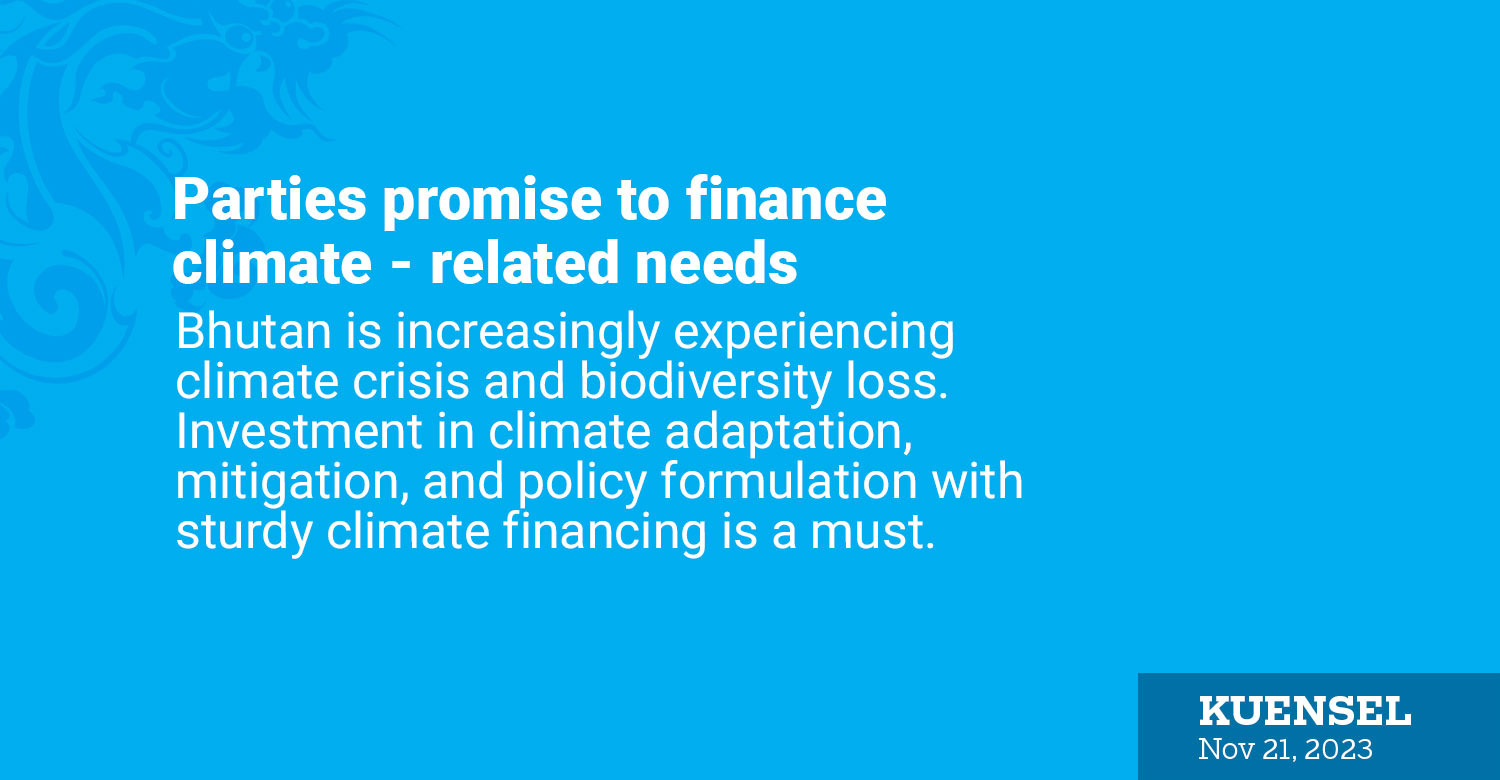YK Poudel
Bhutan is increasingly experiencing climate crisis and biodiversity loss. Investment in climate adaptation, mitigation, and policy formulation with sturdy climate financing is a must.
The attention of all five political parties is centered around adaptation and mitigation programmes.
The government, after the fourth National Assembly elections, is expected to ensure that it aligns with the 13th Plan. At the 28th Conference of Parties’ (COP28) Bhutan Pavilion, which begins in 10 days, is going to be the country’s main narrative.
According to the Nationally Determined Contributions (NCDs), Bhutan as one of the least developed countries (LDCs) would require USD 0.385 billion for adaptation and USD 0.6 billion for mitigation initiatives in the short-term, besides additional USD 6,484.8 million for climate financing projects in long-term.
Bhutan Tendrel Party
BTP believes that balancing economic progress with social and environmental considerations is a complex challenge, crucial for sustainable development. “Despite our current carbon-negative status, there remains a pressing need for further action—a need to reduce CO2 emissions, particularly from the transportation and energy sectors.
This reduction is essential to mitigate our carbon footprint effectively.”
The party promises to implement a climate action plan with revision and amendment of policies on the environment, promoting sustainable land use practices. “Participate actively in international climate negotiations and contribute to global efforts in combating climate change.”
Druk Nyamrup Tshogpa
DNT promises to build disaster-resilient infrastructure that is also environmentally friendly.
With climate change and induced risks, DNT has pledges centered around certain areas that include prioritisation of water resource management, initiation of carbon market access and credit mechanism, strengthening agro-meteorology services, and instituting index-based crop insurance to enhance adaptation to climate change impacts, and becoming a world leader in the management of water resources.
“With the impact of climate change and the rapid melting of the glaciers, it has become imperative that we secure other sources of energy. For example, the 7MW wind energy generated at Rubisa and solar projects in CFM and Dechencholing, Thimphu,” according to the party’s manifesto.
Moreover, the party has pledged to explore better financing for water management through accessing green climate funds in collaboration with national and international agencies.
Druk Phuensum Tshogpa
DPT, in pursuit of environmental conservation, aims to make Bhutan a leading champion in the world in environmental conservation and ecological well-being.
“We shall not waver from Bhutan’s commitment to stay environmentally healthy and green—where our people thrive in harmony with nature,” the party says.
The party pledges to mitigate and adapt to climate change. “Bhutan is no exception and even more vulnerable given its ecological fragility and limited economic resilience.”
DPT will establish a global centre for environment and climate studies in Bhutan using the currently available physical infrastructures, and establish a high-powered body to undertake carbon trading leveraging Bhutan’s carbon-neutral position.
DPT promises to initiate Clean Development Mechanism (CDM) projects in the country and incentivise community projects geared towards mitigating and adapting to climate change.
The party also promises to protect and conserve water sources, protect rare species and their habitats and bio-trading opportunities with certain incentives for the ones actively involved.
Druk Thuendrel Tshogpa
DTT mentions environment and climate as the GNH brand equity and economic diplomacy. Quite technical for the voters to understand.
According to the party manifesto, in addition to the renewed focus on global sustainable issues and climate change, there are recent theories on market value trying to monetize the previously unaccounted value of the environment. “It is now time for Bhutan to reap this brand Bhutan and GNH with focus on raising the maximum awareness on Bhutan’s sustainable policies and networking at the international forums with the intention of raising at least USD 1B in five years.”
DTT has promised to source green financing of USD 1B from UN and other financing windows.
According to the party manifesto, Bhutan has been a late entrant in the carbon trading regime under the Kyoto Protocol and has not benefitted yet. The party has promised to Establish the Bhutan Climate Fund (BCF) with seed funding of USD 50M sourced from multilateral agencies and development partners.
Additionally, DTT has pledged to register at least two projects annually to participate in regional and global carbon markets as well as sign understandings to a minimum of five regional and global carbon markets.
People’s Democratic Party
PDP has included environmental conservation and climate financing under the fourth pledge of its 13 pledges. However, the party does not have adequate promises for the conservation of the environment and climate financing.
The party promises to adopt and implement effective conservation and safeguard measures to ensure a sustained ecosystem such as the rivers, forests, and pasture land.
Bhutan, according to the party, will witness improved and responsible tourism that is sensitive and mindful of the long-term interests of the highland communities spread across 12 northern dzongkhags.


